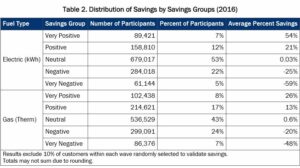
Okay, for the wonks among you: At my request, the State Corporation Commission staff directed me to the full report on Pacific Gas and Electric’s Home Energy Report (HER) Program, which found that more people in the program increased their consumption of electricity and gas than decreased it.
The SCC staff had reproduced two pages of the report in its comments on Dominion Energy Virginia’s proposed demand management programs. I cited their citation at the beginning of a Bacon’s Rebellion report a few days ago. With the original report, I could extract the chart used above, which was used by the SCC staff but with a copy too blurry to reproduce.
 Along with the static data for 2016, which is bad enough, the report by Opinion Dynamics also tracked various waves of participants over time and found the trends held: “For electric participants, the percent of negative savers appears to increase annually for all waves. For electric participants, the percent of negative savers increases with duration of treatment.”
Along with the static data for 2016, which is bad enough, the report by Opinion Dynamics also tracked various waves of participants over time and found the trends held: “For electric participants, the percent of negative savers appears to increase annually for all waves. For electric participants, the percent of negative savers increases with duration of treatment.”
The report never discusses people who increased consumption of electricity or natural gas. These customers are referred to as “negative savers.”
The 72-page report is packed with more charts and tables than clear exposition and firm conclusions. Opinion Dynamics worked hard on trying to figure out what was driving the various responses, with the goal of either focusing the program on those who seemed responsive or revising the program to spark changes in behavior. Others may dig deep in this and find the pony where I see a big pile.
Some of the statements included did jump out.
Very positive electric savers tend to have higher average baseline consumption (before the program) than other savings groups. This is consistent with existing research that suggests that baseline consumption is correlated with larger energy savings. Further, these customers tend to have higher summer and winter baseline consumption than other savings groups as well. However, for electric participants, those with very negative savings also tend to have higher baseline consumption than neutral or positive or negative savings.
Brilliant insight! In order to substantially cut consumption, you must have plenty to cut. And if you are already a heavy consumer, you might not care and keep using more.
Implication: This result suggests that a select group of participants contribute to savings. As a result, program delivery could focus on maximizing savings from positive savers through potentially increasing report delivery frequency or identifying more targeted messaging strategies, particularly for electric participants. Further, PG&E could consider removing some negative savers or reduce the frequency of reports to those participants.
Focus on those who are responding! Oh, and that was not the only place where the report suggested as a solution merely dropping the unresponsive customers out of the program. Good advice, but also an admission that the program simply does not change behavior.
Elsewhere one reads that low-income customers in the company’s bill subsidy program are not cutting consumption, and that one subgroup showing lower consumption consists of people who have installed rooftop solar panels for net energy metering. A small group with growing consumption is comprised of folks charging their electric cars overnight, identified by their use of an EV rate.
Since the first story, I’ve also found more information on the program. If indeed the practice is to send customers detailed monthly information on how their usage compares, why is there such shock that some people might respond with complacency on being told they are average, or celebrate their status as low energy users with a decision to crank up the AC?
Oh yeah, I really want Dominion to increase my bill so it can start doing this in Virginia! Then it too can hire a high-powered consulting firm to tell it that electric vehicles increase home demand, people with somebody else helping pay their bill are not motivated to conserve, and people who put on some solar panels use less electricity. Conclusion: the program is not really changing behavior at all.

Leave a Reply
You must be logged in to post a comment.